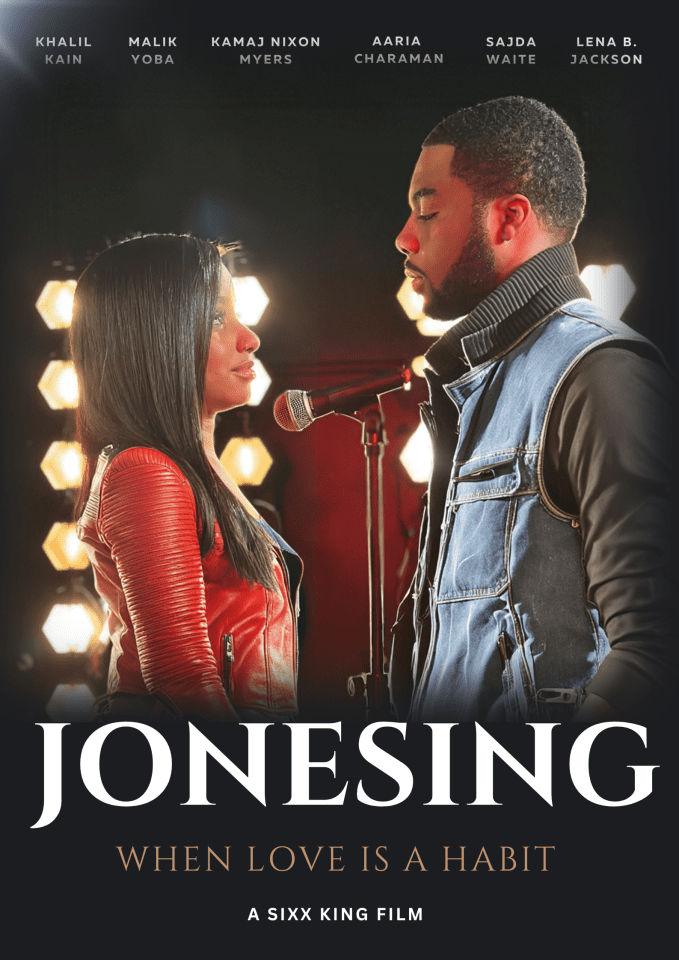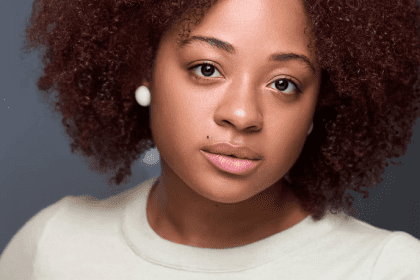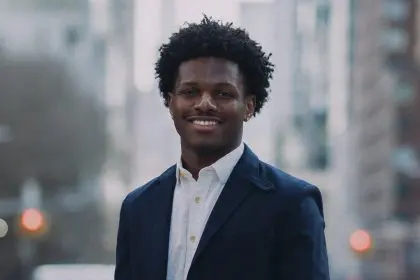
Lena B. Jackson’s journey from a single page in a script to becoming one of the anchoring forces in “Jonesing: When Love Is a Habit” exemplifies the magic that happens when talent meets opportunity. The Jamaican-American actress, who began performing at age five in Kansas City, Missouri, brings a decade of dance training and formal education from the New York Conservatory for Dramatic Arts to her breakout role as Mina Moore. In Sixx King’s emotionally charged drama about love, healing, and identity, Jackson’s character serves as both protector and confidant to the film’s ensemble of women, embodying the kind of platonic love that she believes transcends all other relationships. Her grounded presence and ability to convey wisdom through quiet strength has already begun resonating with early audiences, who remember her distinctive movements and the authentic vulnerability she brings to the screen.
How did you first connect with Mina Moore, and what drew you into this film?
Mina was only on one page of the script starting off. Sixx and I, we connected so much as people, and he loved my talent that he expanded on more pages, and she became one of the best friends for Simone, and she ended up being the protector and the bodyguard for Simone and the group. There’s still a softness to her, and she’s still very wise, and she has her comedic moments. I was just able to bring a little bit of myself into this role and all the things that I think of doing but I don’t do, I was able to put that into the role. I fell in love with her as we kept collaborating and creating her, and adding her to more scenes and she became a full force.
How did the importance of supporting women in “Jonesing” influence your approach to Mina?
There’s always gonna be romantic love in this life, but the platonic love, it’s forever. You can never, and I mean never, lose your friends. You can always have your friends. You go through so many heartbreaks within this life, and then you can always call your girls, and they’re always there. While I took on this role, I remembered that. I thought platonic love is always there, it never leaves, and so I recognized how important that was, and I just drew from that as I kept going, as we kept creating, as we kept collaborating. It turned out so beautiful, and people get to see that within this film, how beautiful friendship is, and how strong friendship is. We all connected to each other outside of these roles, so it showed up on screen as well.
What was the energy on set among the female cast, and what was it like to collaborate with Aaria, Layla and the other women?
It was so special! Because sometimes you meet people on different sets and it takes a while for you guys to click, but I feel like all three of us clicked immediately. We talked about our own love lives, and it was so quick. We felt comfortable with each other immediately. We started talking about our own love lives, family, how we got into acting. So all of this was just so genuine, and we got to transfer it over into the screen. It happened so quickly, and I don’t think I’ve ever had that before. I can call them up right now and I’m like, “Hi, how are you doing? Are you great?” It’s so special. It feels so special to me, and I hold it special to my heart.
Which aspects of the film’s themes about emotional habits, self-worth, and healing resonated most with you?
I would say the one that resonated with me most was definitely being the comfort and protector of my friends. My friends call me for anything, I’m taking the first flight out to go see them, to help them with something. If they ever need a piece of wisdom or to be reminded of who they are, how powerful they are, they know to call me. Any sense of pessimism or just skepticism about life and about the wonderful things of this life, they can call me, and they know I’m going to turn it around. I’m the friend that’s a heavy believer in transmutation. Like whatever bad is happening, go ahead and transmute that into something great. If you can’t transmute it into something great, go ahead and find a punching bag. Life is just so wonderful and so beautiful, and I related to that most. Mina’s very quiet, but when she does speak, it’s just complete wisdom coming out of her mouth, and I relate to that. I don’t talk much, but when I do, it usually is something that stays with you.
Did you and Sixx have any specific conversations about how Mina would impact viewers? What guidance did he give you?
It truly was a collaboration, he would give you certain guidance like, “Think of her again as that protector, but of course, add your softness into it. Don’t make her so no one can get to her, so tough that there isn’t a moment of softness or a moment where we see her heart and her vulnerability and her love for her friends.” And that was the guidance. Like, “Yes, this is who she is, but let’s add on your softness to this character.” And it’s going to be expanding upon these pages, so we’re going to have those moments where Mina is very vulnerable, and not maybe with her own heart, but vulnerable in the sense of how she listens to her friends and how she gives advice to her friends. That was the collaboration and the guidelines, and it turned out amazing.
How does your creative background in dance and storytelling help you build your character?
Outside of acting, I did ten years of dance, and I will say movement plays a big part in acting. How does this character walk? How do you want this character to walk? Because the way someone walks says a whole lot about them. How does this character raise their hands? How they shake people’s hands, how they look at people, how they turn their head, move their head. It all gets the audience thinking like, “Oh, she’s moving her head this way. I wonder what she’s thinking?” So my years of dancing, and there’s acting within dancing as well because you’re playing, sometimes you get the teachers that say, “This is the story we’re creating, and we’re going to create it through dance.” So you bring acting to dance as well, and it all collides together. I brought a lot of my dancing experience into every role that I’ve had. With this role, again, a role that is more protector-like but also has vulnerability. There are moments where my hands are very stern, but there’s moments where my hands are like, “Oh love, are you okay?” And I got to use that, I got to use my body, all the way, and it was very freeing.
Is there any scene that you are particularly proud of or that you found challenging?
When you cry on camera, it can be very difficult because you don’t want to go too far with your thoughts that you can’t bring yourself back. And with this scene in particular, I resonated with it a lot because I, myself, had just went through something similar earlier within the year. I thought about that, and then I decided to put on Michael Jackson’s “Gone Too Soon.” So I’m bawling, I’m in tears bawling before the scene. I’m like, “Lord Jesus, Lena, what were you thinking?” So I had moments where I’m looking at different things just to keep me a little grounded. So I don’t lose my head, and I’m just like, “Oh, this was bad. This is a great idea, but this was also a bad idea.” I just go into the scene, we get it done, but that one was, I will say, challenging. It was just very emotional, and I was like, those stories of people that lose themselves because they go too far. I see how that can happen, but I also see how you can bring yourself back. So I got to experience that and deal with that. I won’t say never again, but maybe I’ll go about it differently. Use the technique that I was taught in school, I’ll just go that route.
For viewers discovering you through this film, what do you hope for them to remember about Mina and about you as an artist?
So far, the people have been remembering, again, my movements. They’ve been remembering that, which I love, but on top of that, I also want them to remember that friendship is love. It’s loyalty, and it’s also about being there and protecting your loved ones. I want them to remember that the most, because that’s what I took away from it, just that love, that loyalty, that care, the kindness, but also truly being there for your friends and protecting them when you can, in any way that you can.
How can people watch “Jonesing: When Love Is a Habit” and connect with you?

“Jonesing: When Love Is a Habit” is in theaters June 27th, 2025. So go to your local AMC theater, honey. That’s how you’re gonna watch it, we’re not going to be on streaming services anytime soon, so get into that theater. And to connect with me, first of all, follow @JonesingMovie on Instagram, and then you can find all of our beautiful Instagrams through that, and you can watch our personal journeys as well as the movie’s journey.














